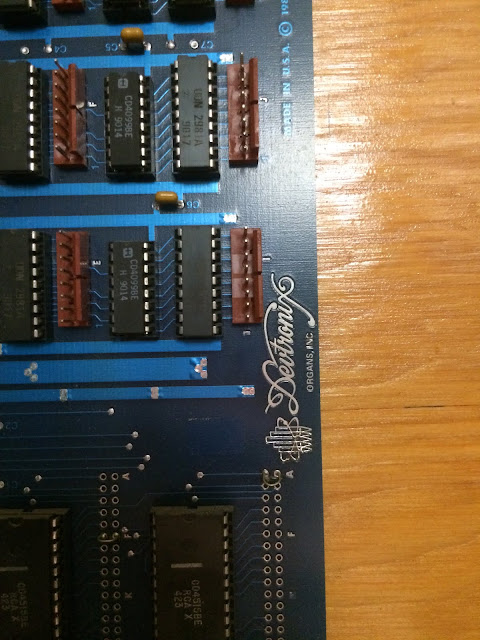A wall was built down the center of the theater in the 1970's by United Artists to turn it into a dual screen cinema. As part of the restoration, the wall has been removed to make it a single house again. The row down the middle shows the scar from the old wall.
The theater also originally had circular seating so each seat faced center stage. When it was converted into a dual theater, a new floor was poured and they changed to more typical straight rows.
The large openings above the stage are for the pipe organ. These had also been covered up and were opened up in 2018. Although open now, here's a few photos of that process while in work to show what went into the restoration.
As seen from the front as organ grille was exposed stage right.
Organ grille from the back in the process of being exposed.
You can see the two projection booths up top.
Each projection window has a 35MM projector with the large film platters.
They also have a couple of original carbon arc lamps which is no longer in use. These would make an amazing lobby display!
The projection booth also has a fire safe for Nitrate film. A true relic from the early days of Cinema!

The balcony is unrestored.

They just restored the Wurlitzer organ. I
chatted with Dave Moreno who is one of the few
in the nation who still knows how to support
them. We talked about the history of the one
at the El Capitan. Apparently Disney got it
from a politician from LaCanada who got it
from a theater that was demolished that he
remembered as a kid. They had a visiting
organist who has played consoles at many
locations including the one at the Nethercutt
Museum.
The Organ is pieced together from original
parts as well as parts of others. The console
came from an auto museum in Sacramento and
previously was in Orson Wells house.
They have restored all the pipes and
electronics. I chatted with Dave Moreno about the
electronics. There's an ethernet cable that
runs from the console up to the D/A converters
up top. It uses proprietary software but can
also operate off Midi files.
Actuator relays for the organ components.
Control board closeup.
The pipes from the organ are truly a site to see! The chairs below the bass pipes give some idea as to their size and scale.
Pipes behind the grill on stage left.

Here a couple movies we took while in the stage left pipe chamber. The amazing Jerry Nagano is at the keyboard!
They are also restoring the 1920's murals and
paint. They are slowly removing paint in
places to see the original colors and
finishes. Notice the railing is about a foot
lower than modern railing.
The restrooms remind us of the wonder of Art Deco!
More behind the scenes, the theater is equipped with dressing rooms for live performances.
Back stage, much of the original lighting and seating has been preserved as well. There is Serious work to be done in restoration!
Remember the days of physical marquee lettering?
Some old film reels.
Hey Look!! A Biunial Magic Lantern! It would be amazing to see this wonderful piece of cinema history come to life again! This beauty must have been used to show advertisements and announcements for the audience to see while waiting for the start of a feature film in the 20's and 30's.
The lenses appear to originally have had shades in front so the projectionist could toggle between two images.
Interesting casting logo. I wonder what brand it is.
Continuing the back room tour, there is significant space above the theater in the attic used for air conditioning duct work. Much of the A/C had to be upgraded to bring the theater up to modern standards. Not very many people get to see this!
Continuing the back room tour, there is significant space above the theater in the attic used for air conditioning duct work. Much of the A/C had to be upgraded to bring the theater up to modern standards. Not very many people get to see this!
And from top to bottom, a few mysteries of the basement!
Hope you enjoyed this tour and history of the Oroville State Theater! More information can be found in the following links:



































